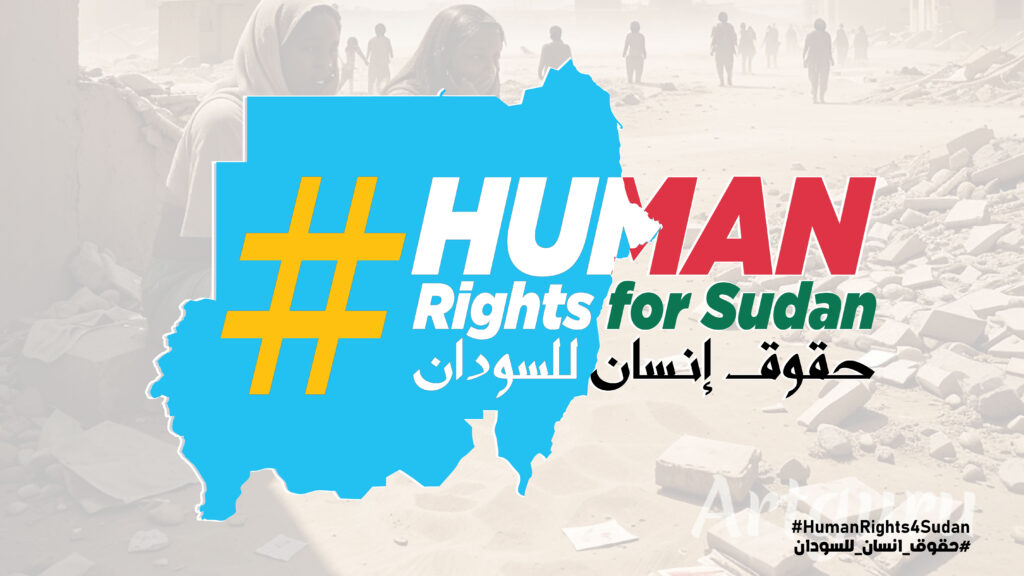Geneva/Kampala.
27 February 2025.
On Monday, February 24, 2025, the 58th session of the Human Rights Council commenced in Geneva, and it will continue until April 4, 2025. This session coincides with more than 685 days since the outbreak of war in Sudan, where grave violations of human rights and international humanitarian law continue at alarming rate, resulting in unprecedented humanitarian suffering. The Continuing military operations have caused the death and injury of thousands of civilians and displaced millions both inside Sudan and across its international borders.
The Sudanese people are facing one of the worst humanitarian disasters of modern times due to the ongoing grave crimes and violations. Civilians are being killed on daily basis and in blatant violation of their right to life. The warring parties and their allied militia groups in Sudan are committing terrifying atrocities against women and children, including sexual violence, arbitrary arrests, and systematic ethnic cleansing. In areas of presence or controlled by the Rapid Support Forces (RSF), martial law and other negative practices have been imposed by the military authorities, while in army-controlled regions and their allied groups, a practice known as “strange faces” has emerged, leading to the prosecution of many civilians. In addition, violations committed by supporters of both warring parties persist, including the obstruction of humanitarian aid, which is used as a weapon of war against civilians.
The atrocities and violations committed by the warring parties represent a flagrant breach of the International Bill of Human Rights, international humanitarian law, the African Charter on Human and Peoples’ Rights, and the fundamental principles of human dignity. Despite this, the regional and international community remains unable to take decisive action to curb these atrocities and violations against civilians, while advanced weaponry continues to flow to the warring factions, further fueling the conflict and exacerbating civilian suffering.
The U.S. government’s decision to halt support for USAID has had a severe impact on the humanitarian situation in Sudan, particularly by halting the flow of humanitarian aid and disrupting emergency response centers and community kitchens that provide essential food and medicine to millions of war-affected Sudanese. Additionally, the situation of Sudanese refugees in neighboring countries, especially in Libya, Ethiopia, Egypt, Uganda, Chad and the Central African Republic, South Sudan remains dire.
Accountability, justice, and the implementation of international resolutions regarding the situation in Sudan must be top priorities in the coming phase to prevent further atrocities and violations. Therefore, we, the undersigned representatives of Sudanese civil society organizations, call for:
1. Further coordination between humanitarian and human rights organizations with regional and international mechanisms, including the Office of the UN High Commissioner for Human Rights, the UN Independent International Fact-Finding Mission on Sudan with a view to supporting documentation, provide evidence to relevant authorities, and ensure accountability, justice and ending impunity.
2. A broad advocacy campaign to highlight human rights violations and pressure the warring parties to end the fighting and destruction of lives and livelihoods, abolish all discriminatory practices, such as the unwritten policy of “strange faces” and other negative phenomena, while upholding and enforcing laws that protect civilians in conflict situations.
3. Special focus on monitoring and documenting violations against vulnerable groups, including unaccompanied children, ethnic and religious minorities, the elderly, and persons with disabilities, especially in displacement camps and refugee settlements.
4. Exposing corruption and the looting of Sudan’s resources by the warring factions and their allies, as well as highlighting war economies that fund the conflict through arms and financial support.
We renew our call to the international and regional community, including the United Nations, the Human Rights Council, the UN Security Council, the African Union, and the Intergovernmental Authority on Development (IGAD), not to leave the civilians in Sudan at the mercy of the warring parties and their allies. Failure to implement international resolutions on Sudan will lead to a catastrophe that extends beyond Sudan’s borders, affecting the entire sub-region. We urge the regional and international community to assume their historical, moral, and legal responsibilities towards Sudan by undertaking concrete action to protect civilians as mere condemnations are no longer sufficient. The Sudanese people urgently need immediate and decisive action. Therefore, we recommend the following:
1. Pressuring the warring parties for an immediate cessation of hostilities, ensuring the protection of civilians, providing essential services to affected populations, allowing unhindered humanitarian aid access, preventing starvation as a weapon of war, and compelling the parties to negotiate a peaceful resolution that guarantees democracy and civilian governance.
2. Activating regional and international accountability mechanisms, including expanding the jurisdiction of the International Criminal Court (ICC) to encompass all the Sudanese territory, strengthening mechanisms to implement human rights resolutions, ensuring the extradition of all the wanted individuals, including General Omar al-Bashir and his associates, delivering justice for the victims, prosecuting perpetrators, and combating impunity.
3. Preventing the creation of de facto authorities based on ethnic or tribal allegiance, which could further fracture Sudan’s social fabric and lead to the division of the country.
4. Providing necessary support to the work of the UN Independent International Fact-Finding Mission on Sudan, especially the recommendation contained in its report of September 2024, and enable it to reach Sudanese refugees in Libya, Eritrea, Egypt, South Sudan and the Central African Republic, and facilitating its work by engaging with host governments to ensure refugees can speak freely.
5. Supporting training programs and capacity-building for human rights defenders, enabling them to document human rights violations using modern technologies, ensuring high-quality documentation and reporting, and establishing a comprehensive protection mechanism that includes legal and psychological support.
6. Ensuring strong representation of Sudanese human rights organizations at sessions of the Human Rights Council and the UN General Assembly in 2025.
7. Establishing robust mechanisms to protect civilians, particularly women and children in conflict areas, enhancing humanitarian response efforts, and activating monitoring and accountability mechanisms.
Signatories:
- Abwab for Development and Social Peace.
- African Organization for Rights and Development (AFORD).
- Al-Qadah News.
- Darfur Bar Association (DBA).
- Darfur Victims Advocacy Organization.
- Democratic Monitor for Transparency and Rights.
- Network of the Independent Commission for Human Rights in North Africa (CIDH AFRICA).
- Nubian Center for Peace and Democracy CNCPD).
- SalaaMedia Center.
- Sudan Knowledge Centre.
- Zamzam International for Arbitration, Justice, Transitional Justice and Peace Center.

